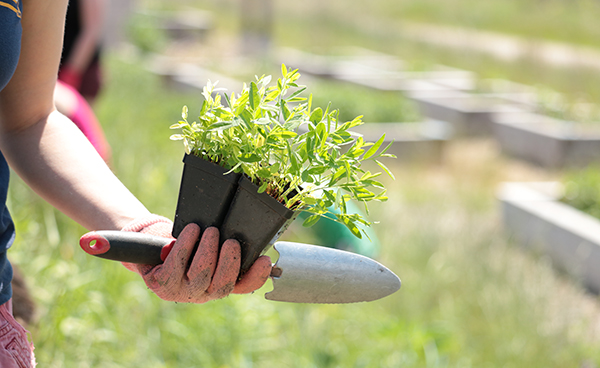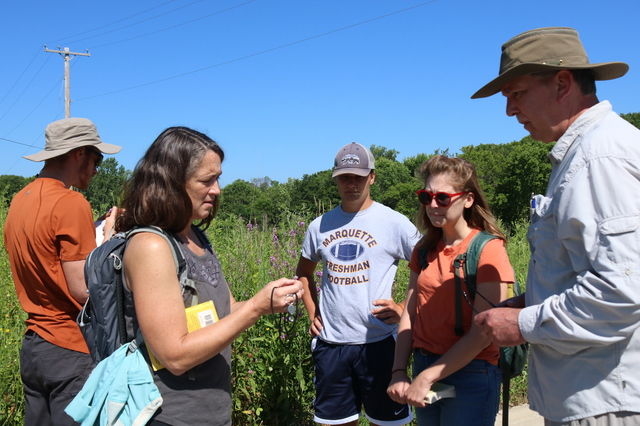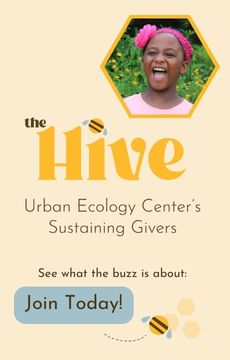The Urban Ecology Center’s Land Stewardship team improves habitat on over 70 acres of urban land, vastly expanding opportunities for outdoor science and recreation. This volunteer-powered, community-engaging restoration work has helped reclaim hundreds of acres of land along the Milwaukee River Corridor, the Menomonee River, and in Washington Park. By removing invasive species, planting a greater diversity of appropriate native species, and mitigating erosion, the Center is restoring ecosystems which support more wildlife and create healthy outdoor classrooms where urban children, families, and residents can learn about their natural environment.
ROOT (Restoring Our Outdoors Together): Come get your hands dirty and help us restore our outdoor treasures together! Help replace invasive species with native plants, trail maintenance, erosion control, and more. Most often we will be outside, so come prepared to go out and dress for the weather. This drop-in volunteer opportunity is available at all three of our branches. Click here to view upcoming times.

The Center’s Land Stewardship team engages thousands of volunteers in its efforts, and in the process, participants are able to take ownership of our shared public places while providing ecological health and dynamic recreational opportunities for our local community. Volunteers learn how to heal the land, rehabilitate degraded ecosystems, and the importance of native plants and plant communities as habitat for birds, mammals, and important pollinators.
This careful and thoughtful community stewardship is paying off - we're witnessing the return of a wide variety of species to our land! These improved natural areas in turn have greater historical, educational, and inspirational value.
Click each location below to hear more about how we've been restoring our shared natural areas:
Riverside Park and the Rotary Centennial Arboretum
Riverside Park and the Rotary Centennial Arboretum
Over the past 20 years, there has been a dramatic increase in biodiversity and habitat quality in Riverside Park and along the Milwaukee River Corridor. Hundreds of species of native Wisconsin plants now thrive in what was once an abandoned park with a degraded forest. Where invasive species such as garlic mustard, Canada thistle, burdock, honeysuckle, and buckthorn once dominated the landscape, a diverse array of native species now supports improved habitat for mammals, birds, and butterflies. Children can experience the authentic splendor of walking through a prairie, oak-savannah, or maple-basswood or oak forest. Thousands of volunteers are engaged through hands-on land restoration projects each year, helping to foster a greater land ethic and more positive relationship with our environment.
The 40-acre Rotary Centennial Arboretum expands Riverside Park with 25 additional acres. The additional land includes land along the Oak Leaf Trail and the Milwaukee River bluff from Locust Street to North Avenue as well as six acres of postindustrial land that were converted from brownfield to a natural park.
Using black landscape fabric to smother invasive species – instead of chemical sprays – our land restoration experts cleared Reed Canary Grass from the river flats along the Milwaukee River, preparing the foundation for later planting of a wide variety of native wet-mesic prairie species. This area earned designation as a Primary Environmental Corridor from the Southeast Wisconsin Regional Planning Commission. Joining our resident year-round critters, wildlife species of all kinds use this stretch as an important migratory corridor each spring and fall.
The project also recovered six acres of barren postindustrial land and converted it into an important entrance to the greater 800-acre Milwaukee River Greenway. The piles of rubble gave way to an area populated by more than 100 native species, representing various native Wisconsin plant community types, for the enjoyment of animals and residents alike. A series of accessible paths allow visitors to venture down to the Milwaukee River to fish, canoe, and observe nature.
Washington Park
Washington Park
The 124-acre Washington Park was once the site of Milwaukee’s zoo. Along with Riverside Park, it was designed by the famous landscape architect, Frederick Law Olmsted. Over the past few decades, this park has served as a traditional park, with scattered trees and mowed grass. One of the wonderful features of the park is the lagoon and its two smaller wetlands. Since the Urban Ecology Center’s Washington Park branch opened in 2007, the Center’s Land Stewardship team has been working with volunteers to improve the habitat areas.
Restoration work at Washington Park includes removing invasive species from wetlands and wooded areas, and planting a variety of native Wisconsin species - a process which has restored the lagoon’s shoreline edges. The Land Stewardship team and volunteers have also established the Lloyd Street Prairie and enhanced the woodland understory.
Washington Park thrives with an edible natives forest, an orchard with beneficial-insect-attracting native companion plantings, and a rain garden designed to absorb surface run off. This park has transformed into a native habitat which provides a home for hundreds of species of butterflies, insects, birds, and mammals and also fosters endless enjoyment for our visitors.
Menomonee Valley
Menomonee Valley
The Urban Ecology Center opened its Menomonee Valley branch in the fall of 2012. Twenty-four acres of land were transformed from brownfield to outdoor recreational greenspace along the southern bank of the Menomonee River, with a spur of the Hank Aaron State Trail running through it.
Where a series of train tracks and piles of rubble once stood, native plant species now flourish - birds, mammals, frogs, toads, butterflies and dragonflies call this park home again. We are grateful for the contributions that many dedicated partners such as the Wisconsin Departments of Transportation and Natural Resources, the Redevelopment Authority of the City of Milwaukee, Menomonee Valley Partners, and others made to the success of this landmark project.
Our Land Stewardship team in the Menomonee Valley has been working to remove an influx of invasive species from this previously degraded and abandoned site. Native Wisconsin species typical of prairie, oak-savannah, and oak-hickory woodland, and wetland areas continue to be planted in the newly transformed soil. Volunteers from nearby Menomonee Valley businesses and the surrounding neighborhoods have been an essential part of this exciting transformation process.

Photo: Phyllis Bankier
Restoring and managing natural areas to better represent the diversity of life forms and communities once native to this region enriches outdoor learning experiences for students of all ages. We're all in this together - join us in healing our land! Click here for more information on volunteer opportunities.

Help us restore urban lands and maintain healthy habitats.
Professional Consultation
$200/hour; ideal for groups of 4-12 people.
Connect with professionals at the Urban Ecology Center to learn how to empower your organization to be a catalyst for positive change in your community via the Urban Ecology Center model. Engage directly with our department heads to ask questions and participate in hands on activities to learn how we do what we do and how you can to! Relevant departments may include:
- Land Stewardship and Restoration
- Environmental Education
- Research and Community Science
- Outdoor Adventure Equipment Lending and Urban Adventure Programming
- Eco-Friendly Event Planning and Hosting
- Green Architecture and Sustainable Building
- Other topics may be available upon request
To set up a consultation, please contact This email address is being protected from spambots. You need JavaScript enabled to view it. for more details or to set up a visit!



